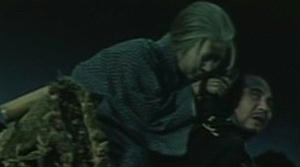
Ballad of Narayama (Keisuke Kinoshita, 1958)
Japanese Title: Narayama bushiko
Tidings of good fortune apparently surface at the beginning of Keisuke Kinoshita's adaptation of the stories of Shichiro Fukazawa. A messenger from a neighboring town arrives at the house of old Orin (Kinuyo Tanaka), announcing the widowing of a female in their town which is a possible mate for her son, Tatsuhei (Teiji Takehashi). She breaks the news to her son and suggest that she undergo the ceremonial climbing of the mountain of Narayama which all aging members of their mountain village should do. Tatsuhei seems disturbed by the news, but with the wishes of his mother, adheres to the marriage and practices carrying his mother on his back.
Tatsuhei is left with a handful of dependents. To add to this, his eldest son insists on taking in his pregnant girlfriend, which the latter family has abandoned. At that instance, there will be two additional mouths to feed, not counting the fact that the girlfriend is pregnant and eats for two people. The mountain village adheres to tradition, mostly concerning food. White rice is only eaten once a year during the festival. Harvests are collected and are distributed to the villagers in corresponding amounts. Although implicitly addressed by Kinoshita, we cognize the fact that in the mountain village, food is scarce and as a result, survival is primary objective overtaking virtues of compassion, respect, and familial ties.
This concept of survival is enshrined in the traditions, the festivities, the laws, and even the general mores adopted by the village people. The wife becomes a useless member of society once widowed, which is why she is immediately offered by her brother to the neighboring town. A thief cannot go unpunished, and such trespassing may result to banishment or total annihilation of the erring clan. An elderly individual becomes useless, and is therefore, forced to climb a treacherous height to meet her unnatural fate, in the guise of religious sanctification. The system works, but the criticism is the resulting idea of dehumanization.
Kinoshita's Ballad of Narayama is filmed in traditional kabuki style with a narrator singing portions of the actual ballad to enunciate what is adequately portrayed visually. The narration is accompanied by the strumming of the traditional Japanese string instrument which is feverishly played to elicit heightened emotions. Kinoshita uses sets and artificial lighting, evoking a feeling of staginess. Time passes not through natural means, but by sudden brightening or darkening of the sets. Everything feels unnatural, the backgrounds are obviously painted, and are mechanically changed upon advancement of the plot. However, the acting is very much controlled, leading to a notion that it is not merely a filmed stage play but a stylized film. Kinoshita is discouraged from using close-ups except when such is proper and needed. His storytelling is disattached and formal but the emotional pullings are tremendous.
Shohei Imamura will later on direct another adaptation of Ballad of Narayama in 1983, and that version will inevitably win the top prize at the Cannes Film Festival. Imamura's version feels more cinematic, as he settles for more traditional (or Westernized) approaches to cinema, rather than Kinoshita's stylized adherences to traditional Japanese artistry. Kinoshita's version may be marred by cultural uniqueness, hindering a more complete appreciation of the film unless a deeper knowledge of Japanese culture is achieved. However, it cannot be denied that the film is truly wonderful. Despite the unfamiliar trappings of the film, one cannot help but ache when Tatsuhei pleads his mother to talk to him on their way to the mountain of Narayama.
One cannot help but feel a tinge of devastation when the first few snowflakes carefully fall, knowing that the mother is atop with only a single blanket and a lump of rice. One cannot help but acknowledge the sacrifices of humanity for mere communal survival, as the son goes back to his village, sees his sons indifference to the entire sacrifice, and listens to his new wife telling him that they too, will have to climb the peaks of Narayama, in adherence to cruel yet needed traditions.







wm.jpg)

























.jpeg)





2 comments:
I truly enjoy your film reviews. Keep it up.
Cata
Madrid-Spain
Thanks Cata,
I'm thrilled to learn that my reviews reach Madrid.
Post a Comment